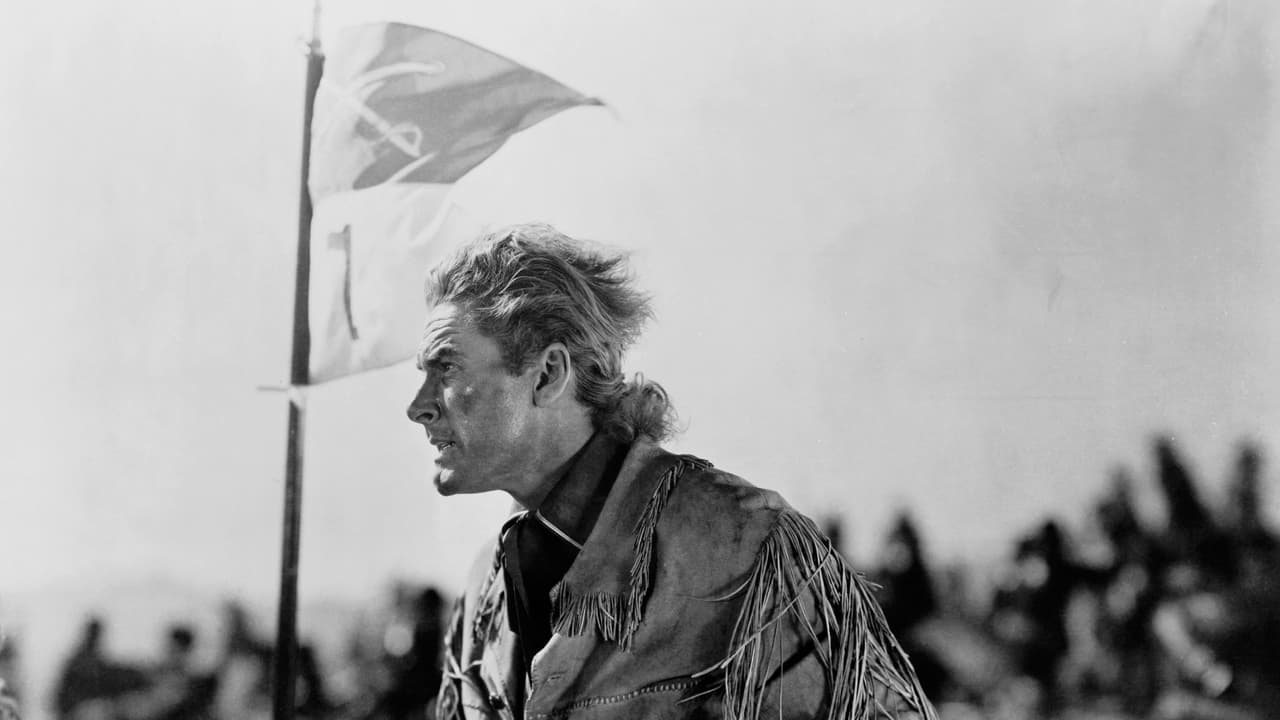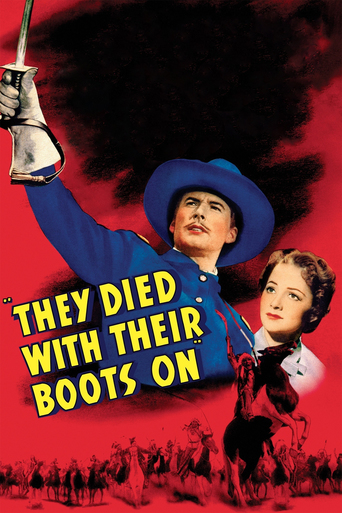

I am only giving this movie a 1 for the great cast, though I can't imagine what any of them were thinking. This movie was horrible
... View MoreWhile it is a pity that the story wasn't told with more visual finesse, this is trivial compared to our real-world problems. It takes a good movie to put that into perspective.
... View MoreEasily the biggest piece of Right wing non sense propaganda I ever saw.
... View MoreA great movie, one of the best of this year. There was a bit of confusion at one point in the plot, but nothing serious.
... View MoreMost of the reviews at least acknowledge that this testoster-wrong self indulgence is historically a catastrophe. Not enough attention is paid to the way in which such films perpetuated the fascist US myths about indigenous people's struggles against imperial invaders and the myopic heroism of a phalanx of Custers, all forged in the lie factories of 1930's films. "But they knew so little about. . . !" No kidding.
... View MoreThe theme of this movie is that glory is of greater value than money. And George Custer is all about glory. Right at the beginning of the movie, when he arrives at West Point, he announces that he wants to be a cavalryman in the army for the sake of glory, to leave behind a name the nation will honor, noting that there are more statues of soldiers than there are of civilians. We shrink from positing glory as a motive today (we prefer to say that soldiers fight for our rights and freedoms), but for any story set prior to the twentieth century, glory seems to be acceptable.Custer makes this statement about glory to Ned Sharp, who will prove to be his nemesis. But at this stage of the movie, he appears to be just a prankster, playing a trick on Custer on account of the fancy uniform and entourage of dogs and a servant he brought with him, a trick Custer seems at this point to deserve. Eventually, Sharp will come to represent the evils of capitalism, which values money above all else. But this side of him must wait until after the Civil War.Speaking of which, the Civil War breaks out while Custer is still a cadet. He is given his commission early and sent to Washington. And then he is made a general through a clerical error. Most Hollywood movies take liberties with history, and this one is no exception, there being so many it would be tedious to list them all. But this one deserves special comment. The reality is that he was made a general because there was a shortage of generals needed to command the ever increasing number of brigades, and Custer seemed to be suitable. By making his promotion to general be just a lucky break instead, the movie is telling us that luck is the only difference between us and a man like Custer. That way we will like him better.Because the Confederacy lost and was eventually reunited with the North, we like to think of southerners as basically good Americans. To this end, the movie never lets us see a single Confederate soldier being killed, and only one wounded Yankee is seen after a battle. We see Custer leading a charge, and we expect to see what we usually do in such cases: men slashing and shooting the enemy soldiers as they break through the ranks of the opposing infantry. But the camera stops filming just as they approach the Confederate soldiers. Then another charge is led, and we think that this time we will get to see some bloodshed; but once again we are denied such a scene. And then a third charge is led, and we think, "All right, the first two charges were just a tease, but now we are going to see a complete battle." Nope. But that's all right. Later in the movie, when war breaks out with the Indians, we get to see lots of slaughter to make up for the bloodless presentation of the Civil War.Just as Sharp kept turning up wherever Custer was during war, as a thorn in Custer's side, so too does Sharp seem to show up everywhere Custer is after the war, except after the war it is always about money. Sharp and his father approach Custer about having him lend his name to a corporation, so that they can all cash in on his renown, but Custer is insulted by the suggestion. Later, when Custer is assigned to the Territory of Dakota, he arrives to find Sharp selling guns to the Indians and liquor to the troops, who spend all day in the bar.Custer closes down the bar and runs off the Indians. Then he decides to get the regiment in shape, to make them a fighting unit. To this end, he has them learn the song "Gary Owen." I guess songs go more with glory than with money, which is why Sharp doesn't have a song to go with his money-making schemes. In addition to the song, Custer tells his men that their regiment will be immortal, even should they die in battle. And later, he tells Sharp that unlike money, which you cannot take with you when you die, glory stays with you forever.The Sioux Indians sign a peace treaty, giving them the Black Hills. But when Sharp and his associates want to get their hands on the land for development purposes, they start a rumor that there is gold in them thar hills, hoping to cause a gold rush that will overwhelm the Indians with settlers, who will then be supported by the government. Actually, it was Custer who started the gold rush by announcing that he had found gold in the Black Hills, but that would not be in keeping with the movie's narrative arc, which is that Custer wants glory and Sharp wants money, and so the story about gold is attributed in the movie to Sharp instead.Custer kidnaps Sharp and brings him along to the Little Bighorn. Custer figures they will all be killed in the coming fight, and by bringing Sharp along, he will bring about the demise of the one person in the movie in whom all the evil seems to be concentrated. Instead of running away, however, Sharp redeems himself in the battle, and dies telling Custer he was right about glory after all. And apparently he was too, because in the last scene of the movie, we see the images of Custer and his regiment riding to the tune of "Gary Owen," thereby reassuring us that the regiment and its glory are immortal, whereas we do not get to see any final images of Ned Sharp engaged in his various profiteering schemes, stuffing money into his pockets as he puffs on a big cigar.
... View MoreMovie makers in 1941 were not interested in giving history lessons, they wanted good characters and lots of action, and this movie delivers both. Errol Flynn was already a well-established swashbuckler when he made this film for Warner Brothers, the last of eight he made with co-star Olivia de Havilland. Custer's comical arrival at West Point is designed for humor, and his record is still an example of what not to do, but no one ever accused Custer of being stupid. He was undisciplined, a prankster, and inattentive to duty, but whenever he came close to being dismissed from the academy, he would straighten up and have a perfect record the rest of the year. He was also one of the academy's most popular cadets, which the movie does a good job of showing. The movie also shows Custer's aggressiveness and success during the Civil War, where he was rightly considered a national hero at age 23. Unlike most generals, Custer did not lead his men from a headquarters, he rode at the front and shared the dangers with his men, who had universal respect for him. It was not until Custer went west, forced to command troops that refused to obey orders and often deserted, that his reputation suffered, and the movie also reflects this transition though in a fictional manner. The Little Big Horn battle is exciting from a movie point of view but is wildly fictional. None of the complexities, tactics or conflicting personalities that guided the battle are dealt with in the movie. What They Died With Their Boots On does best is show Custer's charismatic personality, which Flynn is perfect for. In his lifetime, Custer was considered a generous, honorable and courageous man. Yes, he could be cantankerous and had an ego (so did General George Patton and General Douglas McArthur), but the vision of him as an Indian-hating egomaniac is really a process of 1960s political revisionism, usually propagated by those who get their history lessons from bad television shows. Custer was an officer of the United States Army, and when he went into the field, it was on the orders of U.S. Government, not because he decided to go out and attack Indians. Errol Flynn does a wonderful job of showing Custer from several different viewpoints: glory seeking soldier, loving husband, loyal friend, and a man with a conscience. What this movie lacks in historical accuracy is made up for by capturing the spirit of its characters.
... View MoreFictionalized account of Gen. George Custer's life is still very watchable and very entertaining. This is a movie from Hollywood's Golden Age, when movies and movie stars were bigger than life. Warner Bros. pulled out all the stops to bring "They Died With Their Boots On" to the silver screen, and, although it garnered no AA noms, remains one of Hollywood's most enduring and exciting classics.It is Errol Flynn's picture and he is supported by many of Warner's most recognizable character actors. Love interest is supplied by Olivia DeHavilland and the heavy is played by Arthur Kennedy, and also in the cast are Gene Lockhart, Sidney Greenstreet and John Litel. Crazy Horse is played by Anthony Quinn.Other reviewers have covered the plot but I just wanted to log in my rating and add a few notes. There's a very tender scene near the end of the picture between Flynn and DeHavilland which I thought was worth mentioning as it was unexpected and may be one of Flynn's best ever movie scenes; he was a swordsman first and then an actor. The picture is a little long but maybe fitting for an epic of this stature, because they don't make 'em like this anymore, folks.
... View More